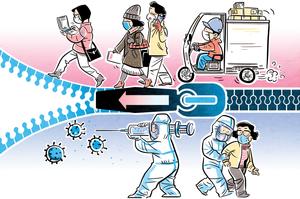Advance measures needed to reduce the impact of coronavirus outbreak on manufacturers
 (LI MIN / CHINA DAILY)
(LI MIN / CHINA DAILY)
The fight against the novel coronavirus remains the top priority for the country at the moment. Nevertheless, how to restore production after the battle is won and minimize the impacts on the economy should not be neglected.
Since the seriousness of the situation became evident, it is the offline service industry that has borne the brunt of the outbreak, especially the hospitality industry and education.
Given that the service industry accounts for a larger share of the economy than during the outbreak of severe acute respiratory syndrome, or SARS, in 2002 and 2003, it is estimated that the impact on the economy will be much greater this time.
However, the impact on the service industry is primarily being felt on the demand side, which is likely to rebound. The overall impact of the epidemic on the offline business of the service industry is limited, and it is expected to gradually weaken. The online service industry may even prosper.
The manufacturing industry has also felt the effects of the outbreak. According to my research into the effects of the epidemic on the apparel, steel, machinery and petrochemical industries in places such as Guangdong, Hubei and Zhejiang provinces, many industries have felt the pinch in different aspects such as recruitment, production and transportation.
Different from the service industry, which is affected on the demand side, manufacturing is feeling pressure on both the supply and demand sides.
Due to people postponing their return to work, and the shortage of protective equipment such as face masks and hazmat suits, industrial production is likely to be delayed. The quarantine measures imposed by the government in a bid to contain the spread of the virus pose severe challenges to the transportation and logistics industries, and enterprises will incur losses due to the delayed delivery of manufacturing orders.
It is noteworthy that the impact of the epidemic on industrial production may extend beyond the first quarter.
First, export orders for manufacturers will decrease temporarily.
Based on statistics since January 2005, the number of export orders usually reaches its peak in March and April. As foreign purchasers are worried about the virus outbreak in China, the delivery time of orders already placed remains uncertain, and there is a high probability of delay.
If production cannot be resumed in March, the orders might decrease, extending the impact on industrial production into the second quarter.
For enterprises with global competitiveness, the problem is less worrying. But for apparel companies, which face competition from companies in other countries, the orders from foreign purchasers might be reduced if the recovery of production in China is slow.
Second, fixed expenses and other difficulties put pressure on the capital chains of enterprises.
During the downtime caused by the delayed return to work and quarantining of employees, enterprises still have to pay fixed expenditures such as rent and interest. Moreover, some enterprises need to pay employees’ wages during the downtime.
As a result, many private companies are struggling under the financial strain. Coupled with the extra costs incurred by the protective measures taken against the virus, these enterprises will suffer a big shock from the outbreak.
To mitigate the shock caused by the epidemic on production, it is suggested that the following measures be taken.
First, targeted tax exemptions and temporary short-term financing should be introduced to ease the capital shortage of enterprises in need, especially private companies. On Feb 1, the People’s Bank of China, along with four other central government departments, issued a circular, promising to ramp up financial measures such as credit easing to provide adequate liquidity to the market to tackle the virus outbreak.
Second, logistics should be resumed soon. As imbalanced supply and demand still plague the market and overcapacity and shortage coexist, the government should not roll out stimulus policies. Rather, it should focus on rebalancing demand and supply, to which the key is to ensure smooth flows of materials. Transport should be kept in smooth operation, and normal logistics transportation should be resumed as early as possible.
Third, to resume the flow of people and industrial production. The government should communicate with enterprises to determine the time before they expect to resume production based on their actual situations.
As the epidemic has not ended, the specific time when normal production can be resumed cannot be determined yet in many places. But, based on information such as the number of confirmed cases, migrant population and enterprises’ measures against the virus, measurable requirements for production resumption should be given for enterprises as reference.
The government should also provide guidance to enterprises in the protective measures they can take against the virus, and ensure abundant supplies of protective gear.
The author is director of the International Development Department of the Institute of World Economics and Politics at the Chinese Academy of Social Sciences. The author contributed this article to China Watch, a think tank powered by China Daily.
The views do not necessarily reflect those of China Daily.


